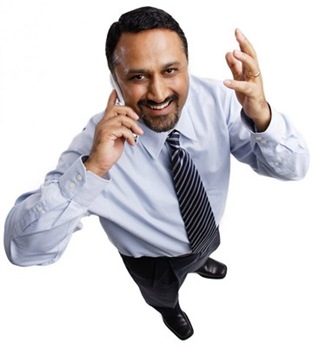Mobile phone based business models – A silent Entrepreneurship revolution.
Around 2006, when I was working for naukri.com, they came out with a revolutionary recruitment product called “Insta-hire”. This product extended online recruiting with cell phones and was an instant hit. I loved this product because it used what I considered was a tremendously potent power to access people who didn’t usually use a PC. Now people outside the tiny population section of PC owners were also available through a simple SMS. And that drastically improved the candidate set for a hiring company and for the candidate. A win-win situation!

You would have seen how cell phones have meteorically grown in India since then. As also as we have written here on Trak.in, telecom industry has grown rapidly to add close to 800 million users. But what usually goes unnoticed is the multifarious, albeit quieter, revolution that this is bringing with it. You can of course advertise, chat, or find out cricket scores on cell phones instantly these days, but what is more profound is the change it is bringing to the poorer sections of Indian society. Entrepreneurs are using this opportunity to create value for people who aren’t yet in the bracket of the great Indian middle class.
EKO financial services is one such innovative company. It uses a simple mobile phone based operating model to provide banking services to people who don’t have banking facilities. This is revolutionary. It allows people with inadequate financial resources to send money back home electronically. I don’t know the details about its profitability, but the sheer volume and spread of its impact makes it a revolution of its own.
The Tata Nano of the mobile world, EKO financial services has already been recognized worldwide and also in India, as shown by the list of 50 emerging companies by NASSCOM.
Another very interesting development was reported by BBC recently. An organization called United Villages has developed a way to ’empower rural people by providing and delivering products, services, and information’. In simple words, they use cell phones to enable remote sales people to log orders from small and remote shopkeepers in a central database. The centralized warehouse then mails the products to the shopkeeper. The per capita value of this service too might not run into lakhs of Rupees, but the number of people potentially benefiting from this service is huge. A much bigger market will now have access to better products which they didn’t have so far, improving their lives in a little, yet significant manner.
I think such offerings have the potential to have an impact similar to what Internet had on a lot of us. These offerings enable a lot of users out of the traditional net to have access to almost similar products that are usually available at a premium they can’t afford. Also, a lot of people also agree that majority of India might not even end up having a PC at home. They might just skip the PC and invest in smart phones, which could serve the same purpose. Such jumping of a generation of technology was already seen with the landlines versus the cell phones.
With companies already working on improving the cell phone capabilities and reducing the cost of a cell phone, it looks inevitable that more people will continue to gain access to more resources. Add to this the revolution happening with Cloud Computing, which gives easy and cheap access to computing resources, and you have a killer combination in hand.
Here is to a rapidly increasing per capita GDP growth! (Which I think is much more important than simple GDP growth percentage)
So, what’s your take on this?

I have another concept for using mobile :
Once this adhar card is issued to every one, the Election Commission should in JV with mobile companies should come up with an app which allows people to vote from their homes. This eliminates the infrastructure (Voting machines, printing of stationary, thousands of officials, hundreds of thousands of police etc). Just on the day of elections, the apps activates on all mobiles and people using their adhar card as their unique identity vote on mobiles. Finer details on how, why, who, when can be worked out if concept is agreed.
It will save fake votes, thousands of crores spent on manpower (both voting officials and police)
Just my two paisa :)
What an idea, Sir-ji !